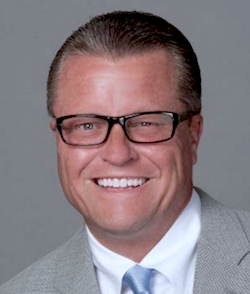
The former CEO of American Senior Communities should be imprisoned for more than 12 years for leading a $19.4 million fraud, kickback and money-laundering scheme, federal prosecutors said in a court filing Thursday.
Defendant James Burkhart “exploited his position as ASC’s CEO for over at least six years, using nearly two dozen vendors, almost as many shell companies, and four co-defendants, one of which was his little brother,” Josh J. Minkler, U.S. Attorney for the Southern District of Indiana, and Nicholas J. Linder and Cindy J. Cho, assistant U.S. Attorneys, wrote in their 46-page sentencing memorandum. “He funneled $19.4 million to himself and others, nearly $10 million of which belonged to Indianapolis’s public health system. And with it, he bought a vacation house, diamond jewelry, private jet flights, and gold bars and gold coins — all for no other purpose than pure greed.”
Lawyers for Burkhart asked for a four-year sentence in their own filing on Friday. Burkhart is scheduled to be sentenced on Friday.
As McKnight’s Senior Living previously reported, Burkhart, former ASC Chief Operating Officer Daniel Benson, Burkhart friend and associate Steven Ganote and Burkhart’s brother, Joshua, were indicted in October 2016 following a September 2015 raid of James Burkart’s home in Carmel, IN, and other locations. Days later, the operator of independent living, assisted living, memory care and skilled nursing facilities fired James Burkhart. Benson was fired, and Chief Financial Officer Roger Werner resigned, in October 2015.
The Burkharts, Benson and Ganote were indicted, and each was charged with one count of conspiracy to commit mail, wire and healthcare fraud, along with multiple other counts of mail fraud, wire fraud and money laundering. Additionally, James Burkhart, Benson and Ganote were charged with one count of conspiracy to violate the federal Anti-Kickback Statute.
Between 2009 and 2015, according to the 32-count indictment, the four engaged in side deals with outside vendors for their own personal benefit, unbeknownst to, and at the expense of, Health & Hospital Corp. of Marion County (which owns 70 Indiana facilities that it pays ASC to manage) and ASC’s owners. Often, the indictment said, ASC and Health & Hospital Corp. intentionally were overcharged for products and services, and then the overcharges were funneled back to the men through a web of more than 20 shell companies. In other instances, according to the government, the vendors paid kickbacks to the men in exchange for doing business with ASC.
ASC sued both Burkharts, Benson, Ganote and Werner in September, alleging that they “systematically looted” the company of “tens of millions of dollars” over the course of seven years. That civil lawsuit is ongoing.
James Burkhart, Benson and Ganote previously agreed to plead guilty to conspiracy to commit mail, wire and healthcare fraud; conspiracy to violate the anti-kickback statute; and money laundering. Joshua Burkhart previously agreed to plead guilty to conspiracy to commit mail, wire and healthcare fraud. ASC, in a statement to the media at the time of the plea agreements, said it was “grateful for the efforts to bring justice in the legal case” and that the plea agreements strengthen the company’s resolve to maintain customer trust.
Sentencing dates have not been set for Benson, Ganote or Joshua Burkhart.
Dave Mazanowski, founder of landscaping company Mainscape, an ASC vendor, also previously agreed to plead guilty to one felony count of conspiracy to commit mail, wire and healthcare fraud in relation to the case. He resigned from his position with the company in October 2016, according to Mainscape.
Federal prosecutors noted in Thursday’s sentencing memorandum that their request for a 151-month sentence for the former CEO was “at the high end of the applicable guidelines” for the crimes.
James Burkhart’s attorneys, Larry A. Mackey and Kathleen L. Matsoukas of Barnes & Thornburg LLP, wrote in their 46-page sentencing memo that their recommendation of a 48-month sentence was based on their client’s “substantial record of good works and character, a limited need for rehabilitation, the nature and circumstances of the harm (which was limited) and his potential to do good in the future.” The recommendation, they noted, was “substantially below the advisory guidelines.”
“To be certain, Jim does not and will not mince words when accepting responsibility for his misconduct,” they wrote. “Thankfully, there is equal certainty that the well-being and care of over 8,000 HHC/ASC residents was never placed in danger by Jim’s crimes. Nor is there any doubt that those residents received the goods and services purchased from the vendors which produced personal profit to Jim.”
James Burkhart “will have made available more than $5.8 million for restitution to any victims of his offenses” by the time of his sentencing, wrote the attorneys, who also cited their client’s Guillain-Barre syndrome as a reason he should be given a shorter prison sentence. Because of the autoimmune disease, they said, “Jim suffers from limited to no feeling in his fingertips and the bottoms of his feet; limited to no hearing in his left ear; balance issues; diminished feeling in his extremities; and permanent muscle weakness.”
The attorneys also noted ASC’s civil lawsuit against James Burkhart and others in the case. “Jim respectfully points out that ASC’s assertions that ASC suffered loss from ‘other frauds’ are inaccurate and unsupported, and not relevant to this criminal case,” they wrote, adding, however, that the civil case, not the criminal one, “is the proper forum to address the legitimacy of those claims.”
See “Related Articles” below for background on the case.



